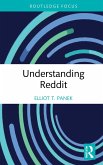Asynchronicity is a study of the information stress and its genesis in the accelerative dynamics of computation and automation. In simple terms, this volume illustrates how anti-democratic communication has become characteristic of our present social and political reality. This book is significant in two respects. By fully realising a general theory of social time, it advances temporal analysis as a mode of social enquiry. Grounding the production of time within the event-dynamics of media systems, it establishes a framework for analysing the temporal logics of digital media, and shows that they may be fundamentally incompatible with the requirements of democratic communication.
Hinweis: Dieser Artikel kann nur an eine deutsche Lieferadresse ausgeliefert werden.
Hinweis: Dieser Artikel kann nur an eine deutsche Lieferadresse ausgeliefert werden.
"Philip Pond's Asynchronicity perceptively blends the physics of time with a phenomenologically filtered interpretation of the experience of it, so to understand the 'weird' qualities of time produced by the 'interactions between systems in a complex world'. In a highly innovative move, his theoretical framework refashions the concept of scale to capture the effects and meanings of the 'radical presentism' of temporal experience. The manifold implications that flow from this perspective in the context of a mass network media are thus laid bare - with a chronically polarised politics the most troubling consequence of the mounting informational crises that we face today. A vital read for anyone seeking intelligibility amidst the fog of digitality."
Robert Hassan, Professor of Media and Communication at the University of Melbourne
Robert Hassan, Professor of Media and Communication at the University of Melbourne








